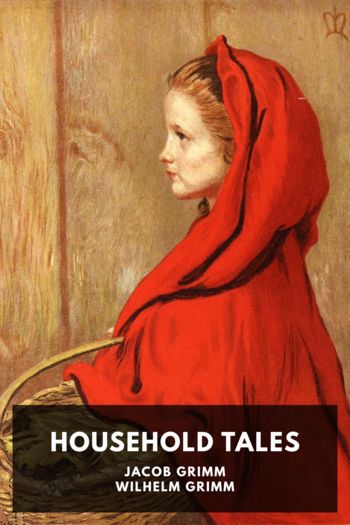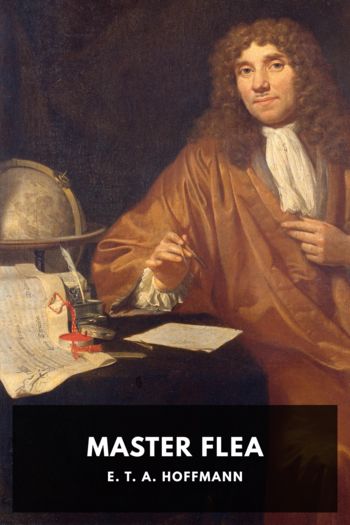Household Tales - Jacob Grimm (read me a book .txt) 📗

- Author: Jacob Grimm
Book online «Household Tales - Jacob Grimm (read me a book .txt) 📗». Author Jacob Grimm
Hans loaded himself with the stones, and went on with a contented heart; his eyes shone with joy. “I must have been born with a caul,” he cried; “everything I want happens to me just as if I were a Sunday-child.”
Meanwhile, as he had been on his legs since daybreak, he began to feel tired. Hunger also tormented him, for in his joy at the bargain by which he got the cow he had eaten up all his store of food at once. At last he could only go on with great trouble, and was forced to stop every minute; the stones, too, weighed him down dreadfully. Then he could not help thinking how nice it would be if he had not to carry them just then.
He crept like a snail to a well in a field, and there he thought that he would rest and refresh himself with a cool draught of water, but in order that he might not injure the stones in sitting down, he laid them carefully by his side on the edge of the well. Then he sat down on it, and was to stoop and drink, when he made a slip, pushed against the stones, and both of them fell into the water. When Hans saw them with his own eyes sinking to the bottom, he jumped for joy, and then knelt down, and with tears in his eyes thanked God for having shown him this favour also, and delivered him in so good a way, and without his having any need to reproach himself, from those heavy stones which had been the only things that troubled him.
“There is no man under the sun so fortunate as I,” he cried out. With a light heart and free from every burden he now ran on until he was with his mother at home.
Hans MarriedThere was once upon a time a young peasant named Hans, whose uncle wanted to find him a rich wife. He therefore seated Hans behind the stove, and had it made very hot. Then he fetched a pot of milk and plenty of white bread, gave him a bright newly-coined farthing in his hand, and said, “Hans, hold that farthing fast, crumble the white bread into the milk, and stay where you are, and do not stir from that spot till I come back.”
“Yes,” said Hans, “I will do all that.”
Then the wooer put on a pair of old patched trousers, went to a rich peasant’s daughter in the next village, and said, “Won’t you marry my nephew Hans—you will get an honest and sensible man who will suit you?”
The covetous father asked, “How is it with regard to his means? Has he bread to break?”
“Dear friend,” replied the wooer, “my young nephew has a snug berth, a nice bit of money in hand, and plenty of bread to break, besides he has quite as many patches as I have,” (and as he spoke, he slapped the patches on his trousers, but in that district small pieces of land were called patches also.) “If you will give yourself the trouble to go home with me, you shall see at once that all is as I have said.”
Then the miser did not want to lose this good opportunity, and said, “If that is the case, I have nothing further to say against the marriage.”
So the wedding was celebrated on the appointed day, and when the young wife went out of doors to see the bridegroom’s property, Hans took off his Sunday coat and put on his patched smock-frock and said, “I might spoil my good coat.” Then together they went out and wherever a boundary line came in sight, or fields and meadows were divided from each other, Hans pointed with his finger and then slapped either a large or a small patch on his smock-frock, and said, “That patch is mine, and that too, my dearest, just look at it,” meaning thereby that his wife should not stare at the broad land, but look at his garment, which was his own.
“Were you indeed at the wedding?”
“Yes, indeed I was there, and in full dress. My headdress was of snow; then the sun came out, and it was melted. My coat was of cobwebs, and I had to pass by some thorns which tore it off me, my shoes were of glass, and I pushed against a stone and they said, ‘Klink,’ and broke in two.”
The Gold-ChildrenThere was once a poor man and a poor woman who had nothing but a little cottage, and who earned their bread by fishing, and always lived from hand to mouth. But it came to pass one day when the man was sitting by the waterside, and casting his net, that he drew out a fish entirely of gold. As he was looking at the fish, full of astonishment, it began to speak and said, “Hark you, fisherman, if you will throw me back again into the water, I will change your little hut into a splendid castle.”
Then the fisherman answered, “Of what use is a castle to me, if I have nothing to eat?”
The gold fish continued, “That shall be taken care of, there will be a cupboard in the castle in which, when you open it, shall be dishes of the most delicate meats, and as many of them as you can desire.”
“If that be true,” said the man, “then I can well do you a favour.”
“Yes,” said the fish, “there is, however, the condition that you shall disclose to no one in the world, whosoever he may be, whence your good luck has come, if you speak but one





Comments (0)